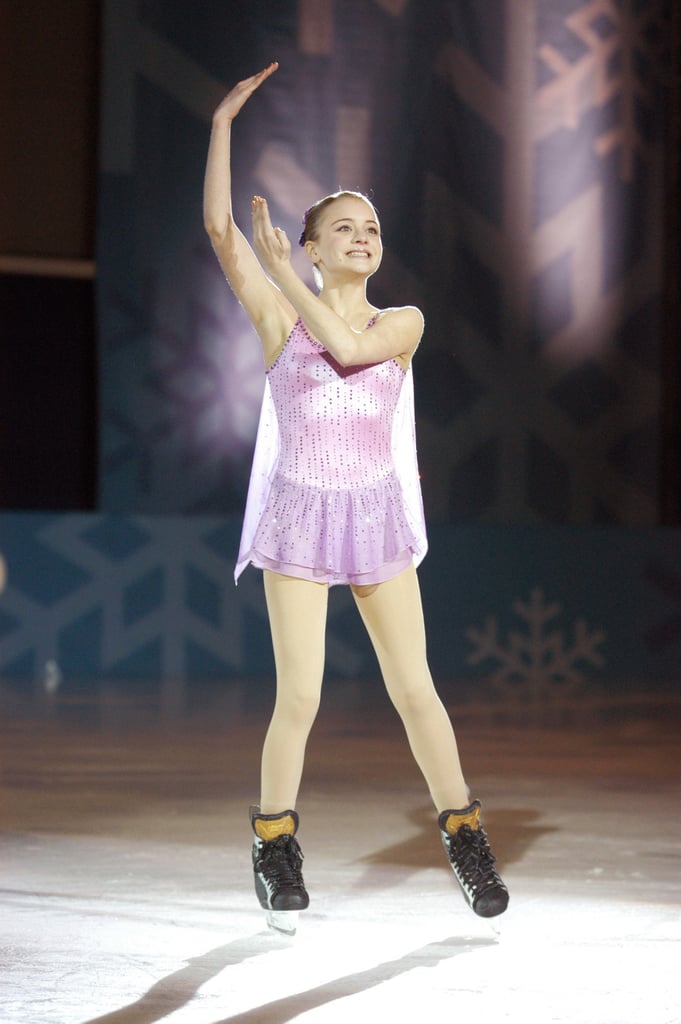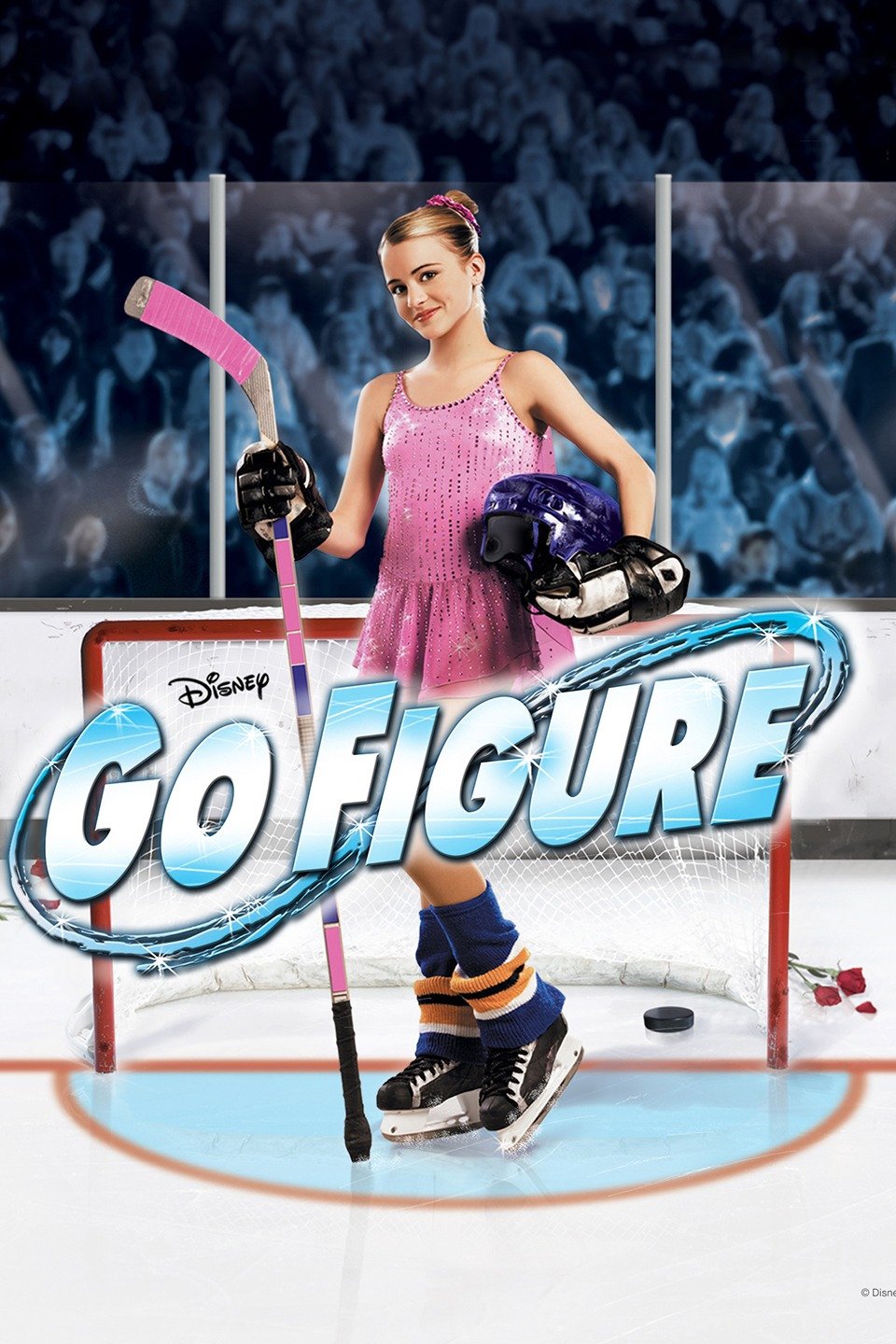Go Figure is a Disney Original Film released in 2005, starring Jordan Hinson. We follow Katelin, a talented young female ice skater, who in hopes of making the US National Team, joins an expensive boarding school on a hockey scholarship, even though she has never played hockey before. Now, I do remember loving this film and I also remember watching it countless times but what I didn't remember was how empowering this film is. The Bechedel Test (a measure of representation of female characters in film , where two female characters must have a single conversation that doesn't concern a man) is absolutely smashed out of the park.
In 2005, there were no mainstream feminists shouting about 'female empowerment'. Beyonce had not blessed us with 'Flawless', Emma Watson was not the UN Women Goodwill Ambassador, feminism had not entered the mainstream. 'Go Figure' was ahead of the curve, examining a young woman who was unforgiving about her talents and who wanted to be better but not at the detriment of her competitors. I would've never expected a relatively underappreciated Disney original film to become a personal feminist classic but just know that my future children will be watching this on repeat.
Female Friendship
To her surprise, when Katelin first joins boarding school, she is told that she must play for the women's hockey team on campus. Now Katelin has never played ice hockey before and as you can imagine, she is no shining star. This coupled with the fact that she is a "twirl girl", some of the most derided people on campus, means that Katelin decides to keep her figure skating career quiet.
As she starts settling into school, we meet some of her team mates: Amy "Hollywood" Henderson, Ronnie, captain of the hockey team and Mary "Mojo" Johnson (I will admit that Mojo has some problematic representation, as the only Asian character in the film, she has a preoccupation with mystical objects, blowing magical dust in peoples faces etc etc, so Disney you fell off there. Do better next time).

Amy, known as "Hollywood" by her friends, is a sweetheart. She is the first to know about Katelin' secret life as a "twirl girl" but is so supportive. After a bit of laughter (right fine, lots) and some defacing of Katelin's, Kristi Yamaguchi poster, she is all for her new room mate. Hollywood can see Katelin's passion and that is all that matters. Even when she is failing the hockey team, Hollywood gives her real talk about where she failed and what she can do to be better. We all need that 'tough love' friend but she's more than that. She doesn't just mindlessly call out Katelin, but offers care and compassion and when Katelin starts to become better, suggesting new strategies for the team, Hollywood is there to convince the rest of the girls that she knows what she is doing.
In their friendship, I saw a lot of my female friendships reflected back to me. The type of friendship where you can admit your stupidest mistakes and lowest points without feeling judged. A space where you can vent but can also gain helpful, insightful advice.
Furthermore, it's Ronnie's evolution in her friendship with Katelin that also deserves a special mention. It's important to note that Ronnie and Katelin are diametrically opposed. Katelin is all leotards, plushies and glitter whilst Ronnie is more hockey, hip hop music and hoodies. But yet, the film never sets them up as mortally enemies. They're never made to hate each other, instead there's a sense of trepidation from both of them which never falls into bitchy or petty terrain. Eventually, we see these two female characters come to respect each other, learning that they have much more in common with each other as opposed to against each other. When the secret finally comes out that Katelin is a "twirl girl", Ronnie's only reaction is shock, not disdain or disgust. Just shock, which she quickly gets over as she is instrumental in getting Katelin to perform again during the Senior Nationals.
The camaraderie between the hockey team is pitched perfectly, Never sickly sweet or bitchy but just normal. They celebrate when they win and even when they lose, it's the fact that the team has made it through all of this together which serves as the main cause for celebration.
Femininity as a Superpower but not a Hindrance
Katelin is the archetypal 'girly girl', when asked about her favourite part of ice skating she immediately replies 'the glitter', don't worry she gives a much better answer 30 seconds after. She loves her plush toys and no one can take her sparkly leotards away from her but this film doesn't use that against her. Katelin is never made into the ditsy blonde, eternally a child. But rather she is an incredibly talented, hard working, intelligent woman AND cares about what she looks like. These are not mutually exclusive, this film teaches us that you CAN and you SHOULD do both.

In the age of Katniss Everdeen, Bella Swan and Lara Croft, the media has ushered in a new form of feminist portrayal, where female characters are tough, don't care about their appearance and are 'down with the boys'. But yet have amazingly toned bodies, immaculate skin and suspiciously coiffed hair.
Amy Dunne's monologue in the absolutely brilliant film 'Gone Girl', sums it up perfectly when she talks about the 'cool girl', saying:
" Being the Cool Girl means I am a hot, brilliant, funny woman who adores football, poker, dirty jokes, and burping, who plays video games, drinks cheap beer, loves threesomes and anal sex, and jams hot dogs and hamburgers into her mouth like she’s hosting the world’s biggest culinary gang bang while somehow maintaining a size 2, because Cool Girls are above all hot. Hot and understanding."
What I would add to Amy's monologue, is that 'cool girls' are almost stripped of any obvious signs of femininity. Think about the 'no makeup, makeup' look that men fawn over but women know actually involves at least 5 different makeup products and a consistently good skincare routine. We need to see the results of femininity but we don't want you to embrace all forms of femininity because then you will be too emotional, too shrill, too volatile. So we have arrived at women who are either hyper strong or women who are the manifestation of men who believe women should solely exist for them.

What is important about this, is that these two types of women are pitted against each other. The radical lesbian feminist who burns her bras and never shaves vs the housewife who is perfectly made up. This image is reminiscent of 'the angel whore dichotomy' seen in Renaissance literature, where a woman could only occupy two spheres. One of the angel, virtuous and passive or the whore, a woman who was completely immoral. Women were placed on an 'idealistic pedestal and then as soon as they sinned' they were 'fallen and impure." Now this may seem like too much for a Disney film analysis but I do think that this film helps to defeat this common trope whereas lots of films (mainly male directed) seek to reinforce it.
Katelin is neither an angel nor a whore. She is neither feminine or masculine. She occupies both spaces. She isn't just a mash up of certain characteristics that men want in a wife, in fact she is the opposite. She's feisty, ambitious and knows her worth. Katelin's characterisation points to a complex woman who revels in her girliness without sacrificing anything.

Romance
There's a little sprinkling of romance with the quintessential Disney 'kiss on the cheek'. But it really isn't important, romance or boys don't rule Katelin's life. It's figure skating, hockey and her friends which are important to her. Another tick on why it's a feminist film for the ages.

Female Ambition
My favourite feminist takeaway from 'Go Figure' is the treatment of female ambition. As Chimamanda Ngozi Adichie said in her groundbreaking speech, 'We Should All be Feminists':
"We say to girls, you can have ambition, but not too much. You should aim to be successful, but not too successful. Otherwise, you would threaten the man."
It seems that either female ambition is something to be viewed as an object of fear or is not given to women at all. Take Lady Macbeth, the ultimate symbol of female ambition gone astray or Phyllis Schlalfly in the brilliant 'Mrs America', an anti-feminist who seeks to stop the Equal Rights Amendment from being passed. She's ambition but not for any good sort of cause. But that is only one end of the spectrum, it is easy to then to find the other side where female characters don't require anything except the love of a man, take 2009's horrible "He's Just Not That Into You".
But 'Go Figure' does something completely different. Here we have a female character who is an amazing figure skater and she makes no apologies about that. It's a well known fact that women often talk down their own achievements, impostor syndrome (https://medium.com/fearless-she-wrote/why-do-women-talk-down-our-achievements-ea39a95b3b59) is a ghost that looms large in the psyche of many women. Talking about our achievements is often peppered them with 'oh but I got lucky', 'oh it didn't even really do that well', 'it was a one time thing , I don't think I could ever do it again.' It seems we are conditioned to make ourselves smaller, never being too forthright with our achievements because we would never want to be perceived as arrogant. A sentiment that I don't really think rings true in the heads of many men. I am a victim of this myself, so much so that one of my female friends made me shout: "I DID A GOOD JOB," with no other self-deprecating comments after. It was very therapeutic, would recommend.
But 'Go Figure' never toys with the idea of not being good enough. Because Katelin is not only good enough, she is brilliant. Even when she fails, she is given time to feel upset but the film also shows us how she tries to improve. She is constantly striving to be better and does whatever she can to make it to the top. But unlike other films, I'm looking at you High School Musical and the much needed justice for Sharpay, this is never painted in a negative light. Her ambition is something that is to be admired and although she's the best in her town, the film offers her vehicles to do better. The film doesn't shy away from the work that Katelin has to put in, at one point she goes home and cries to her mum about the stress, but we see the fruits of her labours both in ice skating and in hockey. The film shows us that female ambition is not only amazing but a desirable trait. That won't drive the guy away or won't mean you have to get rid of all your friends. Like most things in life, balance is the key.
In conclusion, 'Go Figure' was a film that was way ahead of its time. A feminist film that we all need.




